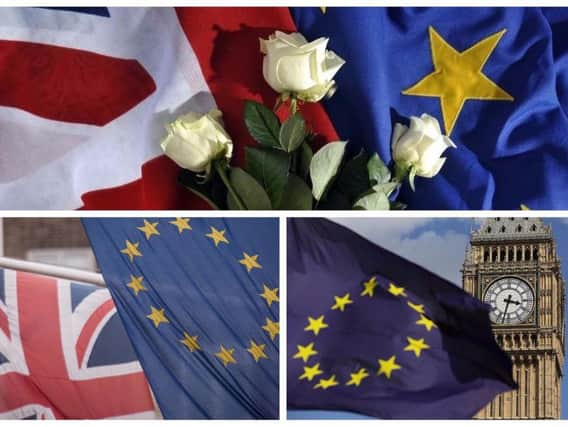'Brexit no deal is nothing to fear if we invest and prepare'


This is not due to lack of effort on the part of the Prime Minister, who set out a positive and forward-looking proposal in her Florence speech. She even made a bold financial offer to move the talks forward. Last week she flew to Brussels ahead of the European Council to underline the positive case that we make.
What was the response of the European Council? It said that we must agree the so-called Brexit divorce bill, and it will not talk trade until we sign on the dotted line. That does not look promising. How can we agree a price until we know what we are paying for? Even if we overcome the impasse on money, the trade talks may not go easily either.
Advertisement
Hide AdAdvertisement
Hide AdMoreover, there is a serious risk of us being offered a bad deal which is worse than no deal. The risk is that we shall be asked to pay £50bn as a settlement for a trade deal that requires us to adhere to EU rules. If that happened, we might as well never have left. We would be run by remote control, without a seat – or a say – at the table.
Our ambition to seek the opportunities that are open to us around the world would be lost, as we would not have the flexibility to change our rules as we might wish to. That would be the worst of all worlds. It is a deal we should not take, and it is a deal that we will not have to take if we make sure we are ready on day one, deal or no deal.
Let us remember that we all want a deal. The EU would benefit from a deal every bit as much as we would. The EU is already the winner in free trade with the United Kingdom: we buy £100bn more in goods from the EU than we sell to it.
What about the view of the British people? This is yet another case where the people are way ahead of our political system. Here we hear voices, particularly from the Labour party, about how we should just write a blank cheque and fold on a deal whatever the terms, yet the British people say “No, we didn’t vote to leave the EU only to pay out vast oceans of cash and be run by remote control”.
Advertisement
Hide AdAdvertisement
Hide AdAs the wider world grows, we can grow with it and this brings me neatly to the case for being ready on day one: why should we be ready on day one? There are three key reasons for that.
The first reason is for insurance. We buy house insurance before we are burgled. In the same way, we should insure against the risk of error in the current negotiations, or things going wrong at the last minute.
We should insure against the risk that there is not a meeting of minds by making sure we are ready on day one, and prepared for every eventuality. Secondly, we should be ready on day one in order to get the best deal. Any experienced negotiator knows that if you have the other side stuck to the table, they will have to do a deal. You can then hit them with a higher price and worse terms.
My third point is that this would be no-regrets spending. We should have made this investment long ago. Our customs systems are creaking, our border systems are ageing and our roads are not resilient. In other words, this is investment that we ought to make anyway. There are strong reasons for us to invest now to have world-class systems. Singapore manages customs clearances in seconds, and Australia has cutting-edge border controls.
Advertisement
Hide AdAdvertisement
Hide AdWe could have systems like that – systems that keep murderers out of the country and ensure that we can track down '‹visa overstayers swiftly and help them home – yet it takes years to build the simplest road, and our airports and ports suffer from long-term under-investment. This has cost our economy billions of pounds already.
Being ready on day one is not simply about Brexit; it is in the national interest to ensure that we have fast, efficient networks that will help to drive our economy forward. It is not just my own constituency of Dover that is affected. Gridlock at Dover will mean gridlock for the British economy.
The Midlands Engine will conk out if it cannot get vital components, and the Northern Powerhouse will cease to whirr if it cannot get parts on time. Tailbacks are not new on the roads to the Channel ports, and this underlines why we should be committing to this spending, irrespective of a no-deal scenario. A no-deal scenario without planning could also cause delays, damaging the economy and preventing Britain from taking advantage of Brexit’s opportunities. Even if a deal is struck, Britain will be hampered if we do not have world-class infrastructure.
That is why we ought to be investing in it now. In order to enable the greatest opportunities of Brexit to be grasped, we must start preparing for a no-deal scenario right away. This would be responsible, no-regrets spending.Charlie Elphicke is the Conservative MP for Dover. He led a Commons debate on Leaving The EU – this is an edited version.